Few horror franchises have taken a more drastic left turn in tone as Val Lewton’s CAT PEOPLE and THE CURSE OF THE CAT PEOPLE. The original is heralded as an all-time classic; a proto noir master class in mood, shadows and suspense. Its sequel, an unexpected family friendly tale of dark fantasy and childhood psychology. CAT PEOPLE has long been considered a pillar of the Queer Horror canon for its exploration of identity, sexuality, and societal pressure. Though vastly different in approach, THE CURSE OF THE CAT PEOPLE brings many of the same themes to completion, illustrating the complicated life cycle from self loathing to defiance to self acceptance.
While the sequel has been relatively well regarded by critics, it fails to deliver on the werecat antics audiences were promised by RKO’s promotional campaign. Producer Val Lewton wanted to name the film AMY AND HER FRIEND but the “CURSE” title was mandated by the studio in order to capitalize on the original’s success. Instead of the gnashing teeth of animalistic desire, we find ourselves in the company of a young, lonely girl whose imagination dissociates herself from her peers and her family’s expectations.
In many ways, THE CURSE OF THE CAT PEOPLE is Val Lewton’s most personal film. A well-read only child born in Russia to Jewish descent, his family spent five years in Berlin before converting to Christianity and emigrating to the United States in 1909. Lewton studied journalism at Columbia University and would eventually publish his first of several pulp novels including GRUSHENKA: THREE TIMES A WOMAN, an erotic novel that almost saddled him with criminal penalties.
Lewton first got his foot in the door at MGM, working in the publicity department as a copywriter and author of movie novelizations. The underperformance of his novels drove him out west to Hollywood where he quickly became the assistant to director David O. Selznick. After working his way up through the studio system, he was eventually given the opportunity to lead RKO’s new horror unit. They would later become a stable of regular collaborators who called themselves The Snake Pit.
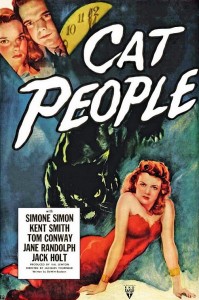
In 1942, RKO released Lewton’s first film CAT PEOPLE. As with THE CURSE, CAT PEOPLE began solely as a catching title. The Snake Pit would figure out the rest. Based on an amalgamation of feline-related horror stories, gay screenwriter DeWitt Bodine produced a script to be directed by Jacques Tourneur. CAT PEOPLE follows the inner struggle of a young fashion artist who is pit between a repressed life in the shadows and the promise of a proper, well-to-do nuclear family. Ship builder Oliver Reed (Kent Smith) courts Irena (Simone Simon) and tries to rid her of her anxieties and eccentricities. Succumbing to carnal urges, she stalks Alice (Jane Randolph) until her dripping flesh is nearly torn to shreds. Irena’s true nature has been revealed. To protect all those around her, she ends her life and suffering thus paving the way for Oliver to live the life he desired with Alice instead.
In THE CURSE OF THE CAT PEOPLE, also written by Bodine, we are introduced to the heteronormative paradise of Oliver’s dreams. Now married to Alice, the couple are raising a young girl named Amy (Ann Carter) with the help of their Jamaican servant, Edward. The Reed Family has traded in a cosmopolitan life in the city for a big, beautiful suburban farmhouse settled in Tarrytown, where The Legend of Sleepy Hollow is said to have taken place.
Their American dream remains on track until Amy’s sixth birthday, when Oliver begins to suspect certain behaviors and patterns that once plagued Irena are now afflicting his daughter. “Amy has too many fancies — too few friends. It worries me. It doesn’t seem normal… something moody — something sickly — She could almost be Irena’s child,” he says, curiously implying that somehow the three of them reproduced the child together. Here, we begin to see the difference in approach to parenting that could greatly impact how she views herself in the world. Oliver’s stern and overbearing grip comes from a place of love and emotional baggage from his previous relationship that may be passed on and internalized by Amy. Every potential moment of confidence and authenticity could be forever marred by shame. Alice tells Oliver, “That’s why I can tell you, straight out, you think too much about Irena — blame yourself for her death. And it’s your thinking and brooding about her that makes you so unnaturally concerned about Amy.” She would later confess to Amy’s teacher Miss Callahan (Eve March), “It’s almost as if there were a curse on us. I wouldn’t care if it were on me, but it seems to be directed against the child.”
The women offer a more holistic approach to child rearing. “I can see it all… the very day it began,” Alice recounts. “Amy was lonely; she was desperate for friendship. I remember the night she told me she had wished on a ring. That must have been the day she first wished for a friend.” Miss Callahan suggests that: “She needed, a companion, so out of her own hunger she created one. In her mind her friend never leaves her… Once the emptiness in Amy’s life is filled, the dream will go of itself… Only you two can bring her into the real world.”
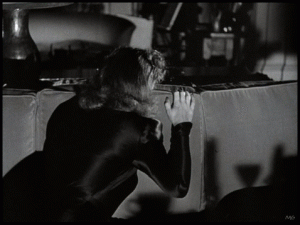
In a cut piece of dialogue by Edward just before Amy blows the candles on her birthday cake, Edward sing-speaks:
One for the one year:
Then she didn’t see a word.
One for the two year:
That was whooping cough we heard.
One for the three year:
She got lost then for an hour.
One for the four year:
She turned pretty as a flower.
One for the five year:
Best child I ever did see.
One for the six year:
I don’t know what that’ll be.
Amy is a lonely, awkward girl without any friends who finds comfort in the conjuring of supernatural forces that come in the form of butterflies, shadows, and song. Like Irena, she knows this upsets her father and uses her birthday wish to assure him that she will be a good girl. “I’ll be just like Daddy wants me to be — play with the other children — not sit around by myself — tell the truth.” Oliver responds, “You’ll make daddy very happy if you’ll just leave that dream world of yours and come into the same world with Daddy and Mommy the nice, pleasant world of everyday things.”
At age six, having an imaginary friend hardly seems like a cause for alarm but Oliver remains haunted by the events from the first film. Despite his best efforts, he couldn’t save Irena from herself. Perhaps she was too far gone. Maybe he could save Amy from the same fate if he could have just intervened soon enough. “I know what can happen when people begin to lie to themselves — to imagine things. I love Amy too much to let her lose herself in a dream world where butterflies become pals. I saw what happened to Irena with her CAT PEOPLE.”
Despite her best attempts, making friends her own age proves difficult for Amy. One day, she comes across a group of girls playing a game on the sidewalk. They tease her and run away causing Amy to follow until they reach the dilapidated, unkempt grounds of The Farren House. “Count three, count four, Run past the door. That’s the best thing to say for witches,” one of the girls say as they run off and leave Amy behind. Here, Amy is first introduced to a Grey Gardens wonderland of dark mystery. A voice from a second story window calls out as a ring tied to a handkerchief floats down to the ground and into Amy’s hands.
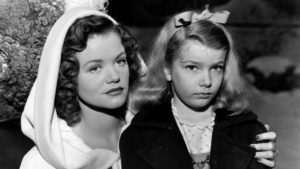
Up until this point, much of the subtext are themes anyone can relate too; being an awkward child, falling short of parental expectations, navigating existential dread – familiar experiences queer people know all too well. Much of the action and character drama so far illustrates a story far removed from the first film. Moving forward, things become much more gay.
CURSE was not Sir Lancelot’s first ride on the carousel for Lewton. In 1943, he appeared in I WALKED WITH A ZOMBIE and GHOST SHIP exhibiting his talents as a famous calypso singer. The character of Edward enjoys plenty of screen time but isn’t given much to do. The script, however, is much more generous. There are several instances in which Edward serenades his housework to songs and monologues that alludes to homoerotic daydreams and scenarios. While raking leaves, he sings a somber Dutch-English song, “Who can blame me if I cry my fill, Johnny has gone for a soldier.” Later, he talks dirty to a chicken as he stuffs it, “Oh, you were a lordly fellow handsome as a king and full of pride. Struttin’ and showin’ off and scratchin’ up the earth and callin’ all the hens to account for this and that. A lordly fellow — and now you lie on your back with your legs in the air.” In a scene cut altogether, Oliver and Edward engage in some steamy craftsmanship. “Oliver is at his hand saw. He is feeding a long thin strip of wood into the saw and Edward stands behind him holding up the other end of the stick… Oliver reaches over for the next stick of wood to cut. The two men take their positions at the saw. Oliver turns it on.” Later, Edward sings “Blow the Man Down,” as he caresses the sails of Oliver’s model ship with a vacuum hose before he is rudely interrupted by Amy. “You’re going to be busy all day long, Edward,” she says. “I do suppose so,” he smiles contently.
Upon discovering Amy’s new ring, her mother demands that she give it back and reminds her not to accept gifts from strangers. When she returns to the Farren house she is greeted by Barbara Farren (Elizabeth Russell), the same cat lady from the first film who addresses Irena as “moya sestra.” Just as beautiful and severe looking though a bit older and worn, she addresses Amy cooly. She introduces her to Mrs. Julia Farren (Julia Dean), an elderly woman who welcomes her joyously and holds court amidst a cluttered room of trinkets. A taxidermy cat above her armchair readies to pounce on a bird. The old Vaudevillian actress is as chaotically adorned with relics as the house itself; heavy makeup, thick wig, jeweled pendants, rings, bracelets, necklace and ribbons dressed in an early century dress with torn and sagging lace.
Dismissing any attempt to return the ring, Mrs. Farren sets the stage and performs The Headless Horseman for Amy. “If you stand on that bridge at the wrong hour — the hour when he rides by, his great cloak sweeps around you, he swings you to his saddle bow, and you have to ride forever your eyes seeing for his blind eyes, your ears listening for his ears long deafened and dead, and always his cold arms around you, crushing you into the cavity of his bony chest. Then forever you must ride and ride and ride with The Headless Horseman.”
This is one of several instances in which the monstrosity of masculinity is portrayed. Earlier in the film, a boy mimes a tommy gun shooting a cat, another boy tries to impress Amy by catching a butterfly only to have crushed it with his bare hands. In both the original and sequel, women retain all the status and power as men embody the threat to their autonomy. This bears extra significance as both films were produced during WWII whereas women took over many of the traditionally male roles in the workplace and society while the men fought and died on the frontlines. In a later scene, Irena helps Amy with her arithmetic homework stating, “One is like a tall princess… and Two is the prince who kneels before her.” In a deleted story thread, Mrs. Farren also tells the story of Herne the Huntsman, a wild man who scours the forest to kills all the animals. “They too must kill and kill, covering themselves with blood.” When Amy comes across a deer, she asks if she can pet the delicate creature to which Irena responds, “It is wildness and freedom. No one can touch it.”
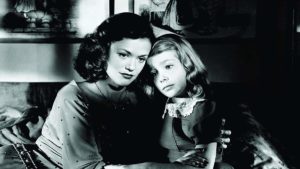
During Amy’s visit, Mrs. Farren condemns Barbara. “She’s always spying on me. She creeps into the room. She lives upstairs, yet she’s always watching me — always!” Though she is her daughter, Mrs. Farren doesn’t recognize her. “A liar — an imposter — your own daughter,” she says. “You call me that and yet you are sweet and kind to the little girl — a stranger –” Mrs. Farren responds, “My daughter, Barbara, died when she was six. That was long ago. You’re only the woman who keeps care of me.” Barbara’s resentment grows. “If that child comes here… if I find her trying to steal your love from me… I’ll kill her. Yes, I’ll kill her.” In the film’s climax, as Mrs. Farren tries to hide Amy from Barbara, she collapses on the stairs and dies of a heart attack. “Even my mother’s last moments you’ve stolen from me.”
We’ve come this far with barely a mention of Irena. It isn’t until Amy discovers a photo halfway through the film that she appears. Irena’s portrait imprints on the young girl inspiring Amy to project her likeness onto her imaginary friend, giving shape to a fairy princess godmother. When Amy asks where she comes from, Irena replies, “I come from great darkness and deep peace.” In one of the most memorable lines from the original film, Irena states, “I like the dark. It’s friendly.” In this film, she calls the cold winter ‘fun.’ Irena has found peace in the darkness, unbound by the pressures of men and society. “Death’s a part of life. It isn’t frightening. It isn’t the end of everything. It isn’t quiet and nothingness. It’s a part of eternity.”
In the final moments of the film, just before Amy is about to be strangled, Irena astral projects onto Barbara, and her cloying hands turn into a warm hug. My reading of the film, and the franchise as a whole, is that the “CAT PEOPLE” are the manifestation of an oppressed person who finds power and comfort in their self-acceptance. Amy has two paths: become who society wants her to be such as Barbara, or live as we truly are like Irena and Mrs. Farren; a universal struggle, uniquely understood by queer people.
In a society that continues to demonize and prey upon queer youth, beacons of hope and understanding become integral to their survival. Irena’s ethereal presence is depicted as alluring and warm much like how the horror genre itself can offer comfort and catharsis to those who are searching for a sense of belonging and needing to have their fears and anxieties validated. This is a theme that carries through all of Lewton’s films. Like a more pleasant Freddy Krueger, Irena reminds us that even in darkness, we are not alone.

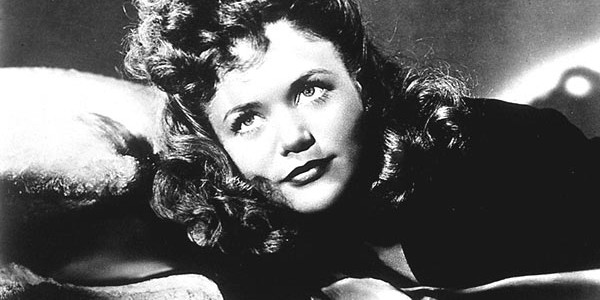
No Comments